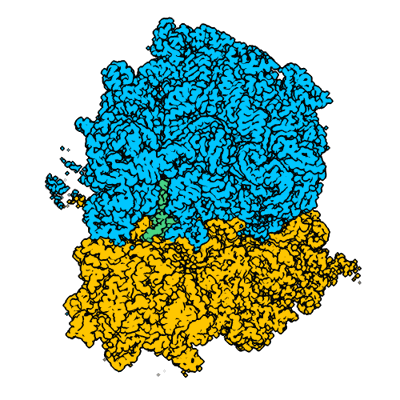EMD-16031
Elongating E. coli 70S ribosome containing acylated tRNA(iMet) in the P-site and AAA mRNA codon in the A-site after uncompleted di-peptide formation
EMD-16031
Single-particle2.88 Å
 Deposition: 27/10/2022
Deposition: 27/10/2022Map released: 16/08/2023
Last modified: 16/08/2023
Sample Organism:
Escherichia coli K-12,
synthetic construct
Sample: Elongating E. coli 70S ribosome containing acylated tRNA(iMet) in the P-site and AAA mRNA codon in the A-site after uncompleted di-peptide formation
Fitted models: 8bgh (Avg. Q-score: 0.56)
Raw data: EMPIAR-11287
Deposition Authors: Koziej L ,
Glatt S
,
Glatt S 
Sample: Elongating E. coli 70S ribosome containing acylated tRNA(iMet) in the P-site and AAA mRNA codon in the A-site after uncompleted di-peptide formation
Fitted models: 8bgh (Avg. Q-score: 0.56)
Raw data: EMPIAR-11287
Deposition Authors: Koziej L
 ,
Glatt S
,
Glatt S 
Modulation of translational decoding by m 6 A modification of mRNA.
Jain S  ,
Koziej L
,
Koziej L  ,
Poulis P
,
Poulis P  ,
Kaczmarczyk I
,
Kaczmarczyk I  ,
Gaik M
,
Gaik M  ,
Rawski M
,
Rawski M  ,
Ranjan N,
Glatt S
,
Ranjan N,
Glatt S  ,
Rodnina MV
,
Rodnina MV 
(2023) Nat Commun , 14 , 4784 - 4784
 ,
Koziej L
,
Koziej L  ,
Poulis P
,
Poulis P  ,
Kaczmarczyk I
,
Kaczmarczyk I  ,
Gaik M
,
Gaik M  ,
Rawski M
,
Rawski M  ,
Ranjan N,
Glatt S
,
Ranjan N,
Glatt S  ,
Rodnina MV
,
Rodnina MV 
(2023) Nat Commun , 14 , 4784 - 4784
Abstract:
N6-methyladenosine (m6A) is an abundant, dynamic mRNA modification that regulates key steps of cellular mRNA metabolism. m6A in the mRNA coding regions inhibits translation elongation. Here, we show how m6A modulates decoding in the bacterial translation system using a combination of rapid kinetics, smFRET and single-particle cryo-EM. We show that, while the modification does not impair the initial binding of aminoacyl-tRNA to the ribosome, in the presence of m6A fewer ribosomes complete the decoding process due to the lower stability of the complexes and enhanced tRNA drop-off. The mRNA codon adopts a π-stacked codon conformation that is remodeled upon aminoacyl-tRNA binding. m6A does not exclude canonical codon-anticodon geometry, but favors alternative more dynamic conformations that are rejected by the ribosome. These results highlight how modifications outside the Watson-Crick edge can still interfere with codon-anticodon base pairing and complex recognition by the ribosome, thereby modulating the translational efficiency of modified mRNAs.
N6-methyladenosine (m6A) is an abundant, dynamic mRNA modification that regulates key steps of cellular mRNA metabolism. m6A in the mRNA coding regions inhibits translation elongation. Here, we show how m6A modulates decoding in the bacterial translation system using a combination of rapid kinetics, smFRET and single-particle cryo-EM. We show that, while the modification does not impair the initial binding of aminoacyl-tRNA to the ribosome, in the presence of m6A fewer ribosomes complete the decoding process due to the lower stability of the complexes and enhanced tRNA drop-off. The mRNA codon adopts a π-stacked codon conformation that is remodeled upon aminoacyl-tRNA binding. m6A does not exclude canonical codon-anticodon geometry, but favors alternative more dynamic conformations that are rejected by the ribosome. These results highlight how modifications outside the Watson-Crick edge can still interfere with codon-anticodon base pairing and complex recognition by the ribosome, thereby modulating the translational efficiency of modified mRNAs.
